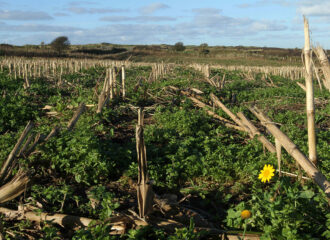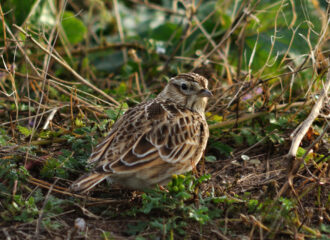Winter stubble fields provide an important source of food for seed-eating farmland birds. In the past these were typically weedy fields with an abundant supply of seed. However, changing agricultural practices have resulted in a steeply declining number of weedy stubbles in the landscape. This decline is mirrored by the decline in Yellowhammers and Skylarks in areas where weedy stubbles are scarce or absent. One of the recommended management actions for increasing farmland biodiversity is to leave cereal stubbles uncultivated and unsprayed with pesticides and fertilisers for as long as possible, until at least mid February. As a general rule, seed-eating larks, finches and buntings prefer shorter stubbles, while game birds prefer taller stubbles. As such, away from shooting areas where game birds are introduced, the provision short stubbles would be the most effective option for recovering the remaining farmland bird populations in Wales.
Stubble fields

Reference state 1 – Weedy stubble
The diminishing area of weedy winter stubbles in the Welsh landscape is having a dramatic impact on the wintering farmland bird populations. Not only have many arable fields been converted to silage fields or permanent pasture in recent decades, many of those that are left tend to be undersown with grass at the time of…

Reference state 1A – Stubbles and birds
The importance of weedy winter stubbles for birds cannot be understated, without them, seed-eating farmland birds will struggle to survive the winter. Recent surveys of >120 ha of farmland in west Wales found that the sole remaining area of weedy stubble on the farm, an area of c.0.5 ha, supported more than 90% of the…

